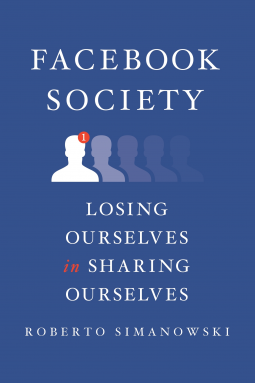
Facebook Society
Losing Ourselves in Sharing Ourselves
by Roberto Simanowski
This title was previously available on NetGalley and is now archived.
Send NetGalley books directly to your Kindle or Kindle app
1
To read on a Kindle or Kindle app, please add kindle@netgalley.com as an approved email address to receive files in your Amazon account. Click here for step-by-step instructions.
2
Also find your Kindle email address within your Amazon account, and enter it here.
Pub Date Jul 17 2018 | Archive Date Sep 25 2018
Talking about this book? Use #FacebookSociety #NetGalley. More hashtag tips!
Description
Simanowski contends that while they are often denounced as outlets for narcissism and self-branding, social networks and the practices they cultivate in fact remake the self in their image. Sharing is the outsourcing of one’s experiences, encouraging unreflective self-narration rather than conscious self-determination. Instead of experiencing the present, we are stuck ceaselessly documenting and archiving it. We let our lives become episodic autobiographies whose real author is the algorithm lurking behind the interface. As we go about accumulating more material for the platform to arrange for us, our sense of self becomes diminished—and Facebook shapes a subject who no longer minds. Social-media companies’ relentless pursuit of personal data for advertising purposes presents users with increasingly targeted, customized information, attenuating cultural memory and fracturing collective identity. Presenting a creative, philosophically informed perspective that speaks candidly to a shared reality, Facebook Society asks us to come to terms with the networked world for our own sake and for all those with whom we share it.
Available Editions
| EDITION | Other Format |
| ISBN | 9780231182720 |
| PRICE | $37.00 (USD) |
| PAGES | 256 |
Average rating from 10 members
Featured Reviews
The author has interesting points in this book. However, I find the sentences here highly convoluted, and that makes the reading experience hard (at least for me). It has lots of verbs in passive voice. The author used too many words or phrases that can be expressed in simple sentences It feels like this book will appeal to those in academics but not for those ordinary folks like me who use Facebook in a daily basis. I wish that the writing style is easier to read.
 Reviewer 331638
Reviewer 331638
I left Facebook late in 2016 and I haven’t returned since. The still unfolding saga of Facebook, Cambridge Analytica and the campaign to leave the EU, and the controversies over fake news have played a role, but I had started despising Facebook long ago.
Truth suffers on Facebook. We tend to trust and be influenced by our peer groups. But on social media our extended peer group may contain a lot of fake people,calculated to manipulate us, to influence us without even realizing it. Every moment Facebook algorithms calculate the chances that a person will act in a particular way and then it directs our behaviour in the sneakiest way possible.
In our eagerness to “connect” with people we are giving up our own freedom. There is a shift, from being free people, we are becoming resources for organizations, such as Facebook which with our voluntary assistance, are harvesting personal views and preference, in order to use or sell the information.
In his long 2018 letter (5.700 words, for God’s sake) he says, “In times like these, the most important thing we at Facebook can do is develop the social infrastructure to give people the power to build a global community that works for all of us.”
I’ ve read this sentence a few times trying to understand. Does he really say that Facebook should run the world? Does he really dream of a Facebook society?
This is the title of Roberto Simanowski’s recent and much-needed book, Facebook Society: Losing Ourselves in Sharing Ourselves, from Columbia University Press and translated by Susan H. Gillespie.
About three hundred years ago, the French mathematician, philosopher and writer Blaise Pascal wrote, “All the unhappiness of men arises from one single fact, that they cannot stay quietly in their own chamber.” Everyone, he said, feels his nothingness, his weakness, his dependence and his emptiness. Without diversion, man won’t be able to sustain himself. Diversion protect us from the thought of death the hunts every human being.
What this has to do with Facebook? Facebook has been presented as a utopia of communication beyond the principles of hierarchical and utilitarian thinking. Facebook has been entertaining the illusion that humans are on the road to a better world. It promotes what we call ‘small talk’, a placebo conversation the offers nothing other than killing time.
Its aim is to avoid to be in Pascal’s “quite chamber” that means to leave one alone with his own thoughts. Facebook and other social networks, offer permanent communication, they guarantee that you will be never be alone with yourself, they keep you permanently busy. Facebook, says Simanowski, “takes care of the problem of meaning in life by getting rid of any time to wonder.”
Facebook mode of communication hinders any productive and well-thought-out conversation. It does not encourage reflection. It restricts any attempt of discussion to the dualistic reaction of likes and dislikes. One’s popularity and evaluation is measured by the number of likes
Is this the global community that we would like to live?


















